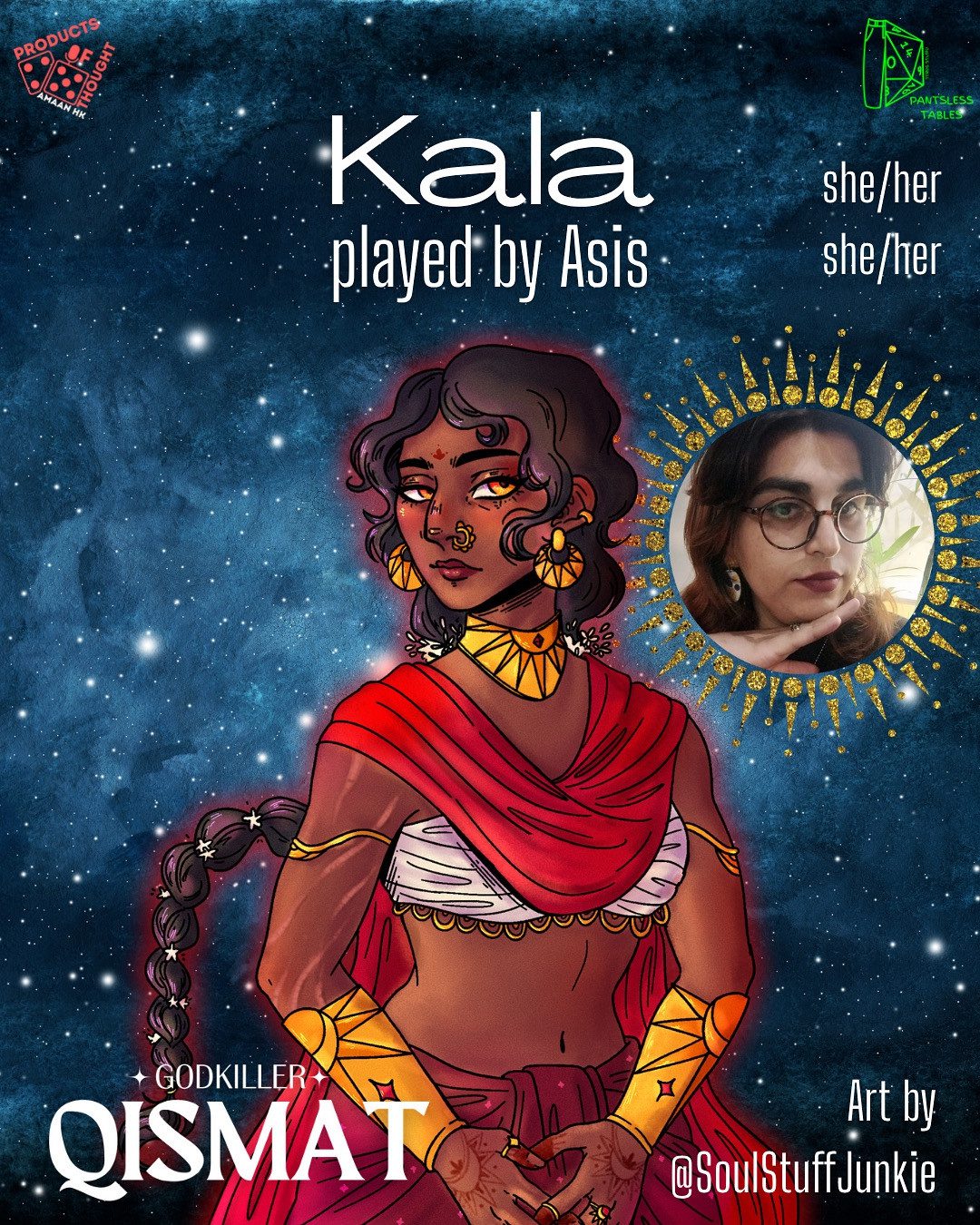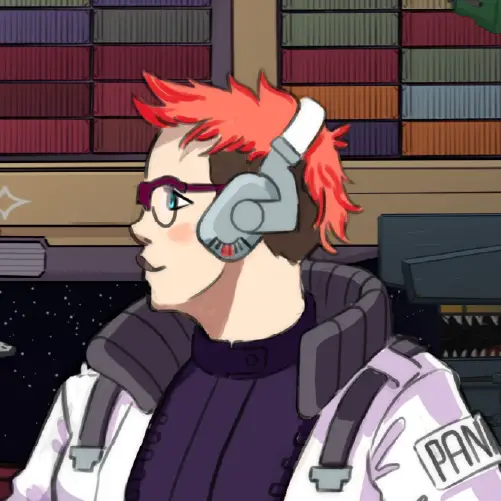It is an inescapable truth that the way we are raised and the community that surrounds us in our youth shape who we become. We more often tell stories about people who break free of those societal constraints, especially in the wake of earth-shattering events. When your entire world is shaken and you are faced with questions you never thought to ask, you can choose to close your eyes or face it head-on.
“That constant process of change is something which is kind of universal […] breaking out of something which you have been taught all your life. That’s constantly a theme that you see in all different cultures.”
– Amaan HK
Qismat is a groundbreaking Actual Play featuring multiple languages and is a celebration of culture and a shared love for telling stories. It’s a leap forward in innovation for Actual Plays and how they can break free from our current zeitgeist, where multiple personal journeys tell a greater story as opposed to a party of characters. The added layer of languages transports you into the culture in a way that other Actual Plays haven’t. It is presented by Creative Producer and editor Amaan HK, host of the Infinite Tavern, with the help of Executive Producer Steve from Pantsless Tables. This production is sponsored by Evil Hat Productions and OtsoSpiritBear, with additional in-development playtest material provided by Connie Chang and consulted by Sea Thomas.
Quick info:
Audio: Good Quality (some room noise)
Vibes: Epic Fantasy, Gods versus Demi-Gods, Superhero, religious themes
Number of Episodes Review is based on: 1 (with an unedited preview of episode 2)
System: Godkiller RPG, Written by Connie Chang
Average Episode time: 1 hour
Language: Multilingual, including Hindi, French, Spanish, and Mandarin, with Captions in English
Platforms: YouTube, Livestream
Content Warnings: Each episode starts with content warnings on screen before the episode
Length: 8 Episodes
The System
Uniquely tailored for only two players, this game is rich in intimate roleplay possibilities. Taking certain actions depends on narrative triggers. For example, if the player wants to get information on an NPC’s (Non-player character) plan, they will need to tell them something intimate. In cases of inflicting blows on enemies, narrative circumstances can increase your chances of success rather than modifiers on a character sheet. This system is a perfect choice for any intense personal journey of powerful beings.
A Setting of Cosmic Divinity
Four planets and four stars, where four Gods decided to make their home. Each planet has its own role to fill, creating life, a hell for the damned, heaven for the rewarded, and a place of dreams. In order to create life, a sacrifice was made to the planet. A part of themselves that had the power to destroy the very life it was sacrificed to make.
The first of the planets is called Khilona, or the cradle’s toy. This domain belongs to the Goddess Khamsa, whose sacrifice produced an ever-consuming star. This planet is the place of creation, where mortals live. Our first episode takes place on this planet.
As Kala traverses the Capital, Amaan introduces the temples belonging to the sibling deities and their champions.
Raaz, or secret, is a mystery to Kala, but the champion we meet there is kind. The god of Raaz is Faris, or Knight. It is suggested from the opening that this may be a planet of dreams.
The champion of Baagh, or garden, offers little and has a cold demeanor. Baagh belongs to Khwahish, or desire. This planet is considered to be a paradise where beauty is treasured. The second episode features this planet featuring Ronce (she/her), played by Marie-Paule (she/her).
The final temple we pass by is Dozakh, or hell. There, we are introduced to a polite pair of champions. The planet belongs to Hannan, or La Llorona, and is the place where the worst people go to suffer after their lives.
Beginning With An End
Sometimes, a catastrophe doesn’t come with a warning; it just happens, and we are left to clean up the debris. Amaan, the first of the four Gods (the system’s term for the Game Master or GM), opens the series with the death of Khamsa, the Goddess of creation and the star of the planet Khilona (Cradle’s Toy).
We are introduced to Kala, the champion and chosen speaker for Khamsa, who, in a blink, bears witness to the death of her Goddess. Kala’s appearance is that of an Indian woman, decorated with red and gold, adorned with symbols of stars. Her adornments celebrate her position and make her stand out as the chosen of a goddess.
Immediately after she hears the scream of her Goddess ring in her mind, Kala is summoned back to the temple. As Amaan guides us through the capital of Khilona, we get glimpses of what this planet is like. There are no violent wars, as the only way to die is for Khamsa, and none goes hungry. The people look to Kala for guidance, not only due to her position, but out of love for her. A kind of love that could breed jealousy and malice.
A Ruthless Villain
Kala finally arrives to the temple dedicated to Khamsa where we are introduced to Gruhidar. He addresses the scared and confused people in the temple. He is described as an older man with the aura of a sun, a sideffect of the power he weilds as a gift from Kahmsa. We learn that the price of the peace and harmony of this planet is soaked in blood, but remains unquestioned as the rewards are too great.
The Team

Kala (she/her)- Asis (she/her)- Kala is given the title of the Trophy of the World, tasked with speaking to the people about Khamsa. Kala is presented as a leader and as someone the people look to for guidance. It may just be because it’s on my mind, but Kala reminded me of the way people love Superman. We meet Kala’s family and an extremely lovable elephant named Sherdil, or Lionheart.
Speaking to Amaan about episode one, he provided more about Asis’s motivations behind Kala’s story. “There’s a trans allegory (in) play as well, where, in some aspects of the Indian culture or the Indian religious stance, people usually venerate the feminine aspect of a human being, and they put it on a pedestal and they worship it. It even extends to the trans community, in India as well […] I’m only speaking on behalf of her because she has spoken about it… It was about people not loving her for who she is, but who they see her as, not who she actually is.”
God – Amaan HK (he/him) – As a “God” Amaan does not shy away from a truly cruel and ruthless villain. A refreshingly unsympathetic villain as well. Despite my language barrier, Amaan has a wonderful way with narration, evident in tone alone. Amaan also takes on the huge task of editing, producing, and storyboarding the entire show. “I was known as a quick storyboard artist, like who turns out frames like that. (snapping his finger) I was like, okay, I’m going to use this in a way to enhance the storytelling in a way.” -Amaan HK. The storyboards are paired with short video clips to help smooth out the editing and bring a unique style to the production.
Future episodes:
“Other people like Apollo, Jack, and Mary Paul, […] have their different approaches too with their stories. Whether it is rebelling against parenthood, whether it is overcoming cowardice, or whether it is just making your place your own and not something which is controlled by essentially a colonizer.” -Amaan HK
- Episode 2, in French, with Ronce (she/her) played by Marie-Paule (she/her), and God played by Arsene (he/him).
- Episodes 3 and 5 will return with Asis as Kala and Amaan HK as God.
- Episode 4, in Spanish, with José (he/him) played by Apollo (he/they), and God played by Tomas (he/him).
- Episode 6, in Mandarin, with Ming Li (he/him) played by Jack (he/they) and God played by Specter (he/they).
- Episodes 7 and 8 will close out the series, with the cast yet to be announced.
Qismat is an incredibly ambitious project that came with many challenges. Amaan mentioned setbacks with scheduling, technical setbacks, as well as the obvious obstacle of editing and captioning four different languages. I applaud the team for persevering through it all to deliver their story. Very few actual plays get the chance to tell such personal stories of self-exploration that reach a global audience.


